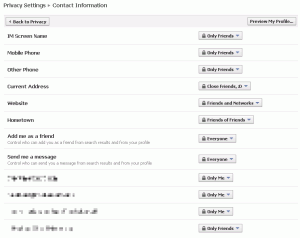 Several days ago, Ryan shared this interesting article: America: Land of Loners? It was definitely a very interesting read, though the 1st half of the article I thought was much more well written than the latter half. I don’t fully agree with every point, but it’s definitely good discussion material. The overall point of the story stroke a chord close to home.
Several days ago, Ryan shared this interesting article: America: Land of Loners? It was definitely a very interesting read, though the 1st half of the article I thought was much more well written than the latter half. I don’t fully agree with every point, but it’s definitely good discussion material. The overall point of the story stroke a chord close to home.
The article is a bit long, but very inspirational. Several commentators said they called up good friends which they’ve lost touch with. Two passages that I liked particularly are:
Aristotle, who saw friendship as essential to human flourishing, shrewdly observed that it comes in three distinct flavors: those based on usefulness (contacts), on pleasure (drinking buddies), and on a shared pursuit of virtue—the highest form of all. True friends, he contended, are simply drawn to the goodness in one another, goodness that today we might define in terms of common passions and sensibilities.
[…] convinced that more Americans are lonely—not because we have fewer social contacts, but because the ones we have are more harried and less meaningful.
Valerie also shared an interesting letter that Hong Kong TV host Michael Leung wrote to his son: 下輩子,無論愛與不愛,都不會再見 (Doesn’t Matter If We Love Each Other Or Not, We Will Not Meet In The Next Life). Unfortunately the letter is Chinese and although very touching and insightful, all the online translation tools are doing a rather horrible job translating it into English. However, I did find someone who has already spent the time translating so I don’t have to: English Translation.
The 2 passages that I wanted to share are:
(一)對你不好的人,你不要太介懷,在你一生中,沒有人有義務要對你好,除了我和你媽媽。至於那些對你好的人,你除了要珍惜、感恩外,也請多防備一點,因為,每個人做每件事,總有一個原因,他對你好,未必真的是因為喜歡你,請你必須搞清楚,而不必太快將對方看作真朋友。
(1) Don’t mind people who aren’t nice to you. In your life, no one has the obligation to be nice to you, besides your mother and I. In regards to people who are nice to you, besides treasuring and appreciating them, please also be careful. Because there’s always a reason for anyone to do anything. Being nice to you might not mean they like you. Please make sure of that and don’t be too quick in trusting people as true friends.
(七)你可以要求自己守信,但不能要求別人守信,你可以要求自己對人好,但不能期待人家對你。你怎樣對人,並不代表人家就會怎樣對你,如果看不透這一點,你只會徒添不必要的煩惱。
(7) You can demand yourself to be trustworthy, but you can’t make others be trustworthy. You can demand yourself to treat others well, but not make others. How you treat other people, doesn’t represent how others will treat you. If you can’t see through this point, you’ll just become frustrated.
So now that I’ve set up my post, it’s time for me to tell you my story. I really like how Aristotle bucketed friends into the 3 categories: utility, pleasure, and true friends. I’m pretty sure I don’t have to explain what friends of utility and pleasure are, but true friends are hard to describe. Not all friends need to fit into 1 single category. They can easily overlap multiple. And no one starts out as a true friend.
Just a few days ago, I forget how this topic came up, but I was describing to Chris how I would determine if someone is really a true friend. I told him if a true friend came up to me and asked if he could borrow (undisclosed amount) of money, I wouldn’t hesitate to give it to them. If a true friend needed a kidney or a liver transplant and mine matched, I would not hesitate to give it to them. As the Chinese saying goes: 赴湯蹈火 (willing to go through water and fire to help). I understand this is a very romanticized view and I haven’t really been put to the test, but I honestly think there are a few people that I’d be willing to go to all extents to help.
In the first article, Daniel Akst brings up the point that our friendships these days are less meaningful, and I agree with that. Besides the courtesy hello I say to my neighbors when I bump into them, I never really talk to them. I did bake cookies for some neighbors some time ago, but that was because they had helped me during the snow storm. Thinking back when I was a kid, I knew practically every family up and down my street. The concept of community and family is not as meaningful anymore nor the bonds as tight as before. Chris told me he knew of a co-worker that worked in the bay area, but his wife lives on the east coast with their child and they meet once a month. Dave and I were surprised a family could even work that way.
In the past, the place you were born was the place you died. The people you grew up around were always the same people, so forming strong bonds were simple. These days, we’re very mobile. We go far away for college, for careers, and the more you move around, the harder it becomes to make strong bonds with people. It’s just human nature to form stronger friendships with people you see frequently and friends you hardly see anymore slowly become more and more distant. That was what happened after I went to college, then again when I moved up to Seattle for work.
However, I think technology and Facebook has made staying connected much more easier. I disagree that having a ton of friends on Facebook has diluted friendships. Not all Facebook friends are equal, just like in real life. I have many acquaintances, but only a few true friends. In effect, technology has removed the physical distance which was a huge barrier for developing strong friendships.
With that said, it wasn’t until very recently which I’ve been pro-active in trying to build and rebuild friendships. In the past, I was very passive. Friends would come and go, and I would never really pursue them. It was never hard for me to make new friends as my personality is generally cheerful and helpful. However, I’ve realized that there are friendships I want to maintain and not lose. It may be cliché to say friendship is a 2-way street, but it really requires both sides to put in an effort. When one side doesn’t really care (me in the past), it’s hard to make it strong and that’s when something as silly as distance can easily break it.
I hope my post has been interesting, if not inspirational. And good luck! (^_^x)




 For the past few weeks, I’ve been slowly locking down Facebook, altering privacy settings, removing data I once thought it was fun to share, and removing applications which I no longer use. If I could, I would delete my Facebook account altogether, but I’ve become dependent on it to keep in touch with friends who I would never keep in contact with otherwise.
For the past few weeks, I’ve been slowly locking down Facebook, altering privacy settings, removing data I once thought it was fun to share, and removing applications which I no longer use. If I could, I would delete my Facebook account altogether, but I’ve become dependent on it to keep in touch with friends who I would never keep in contact with otherwise.



